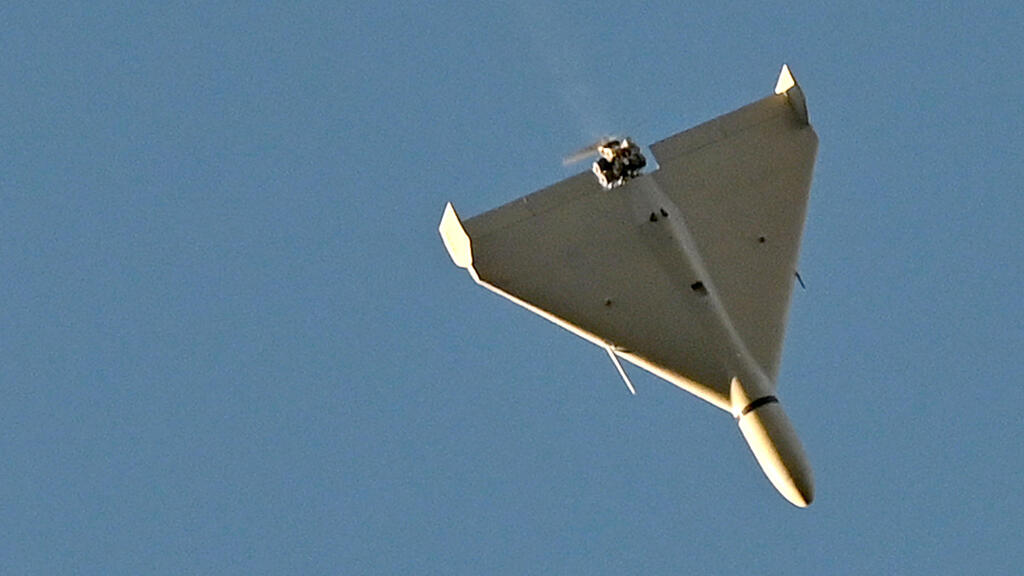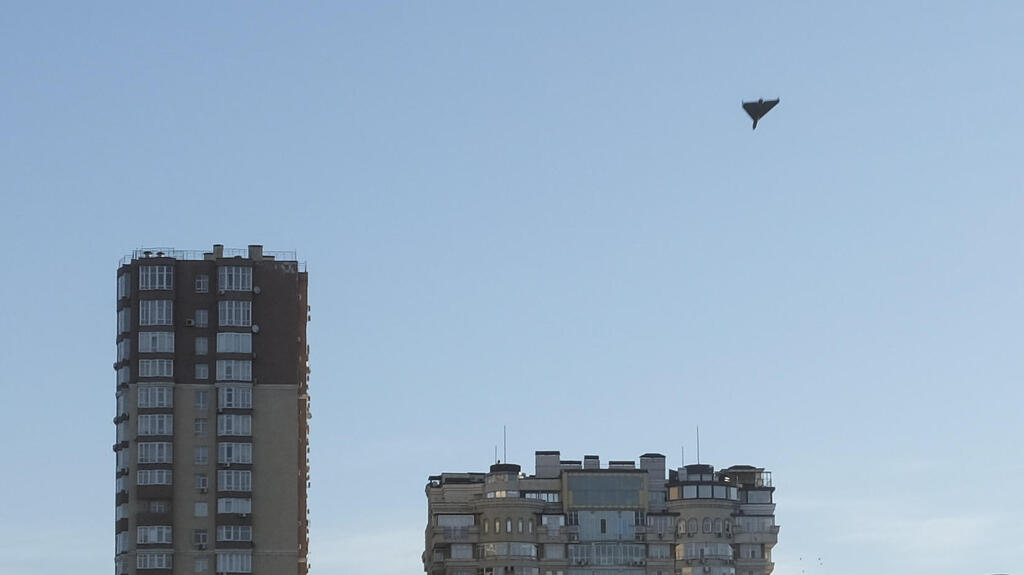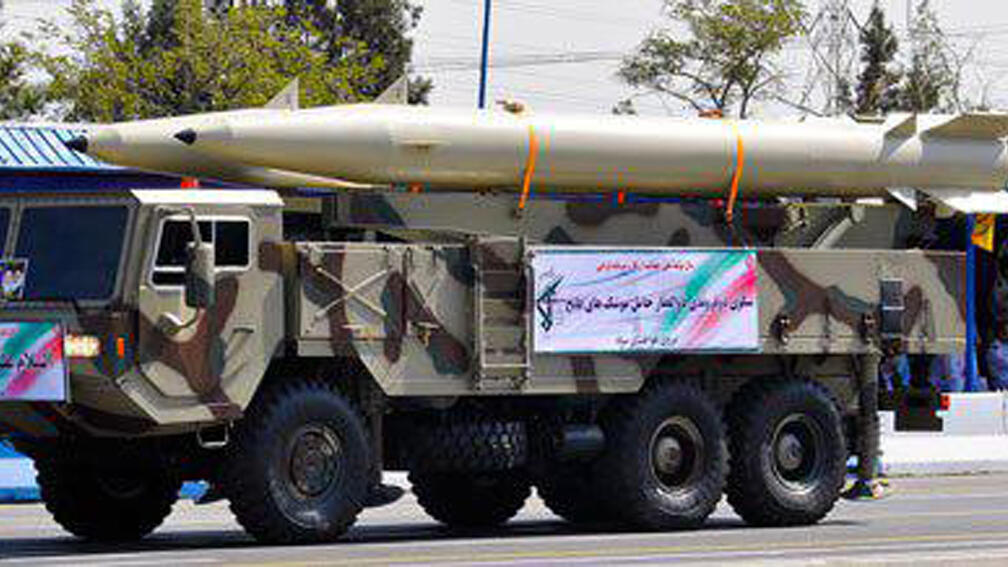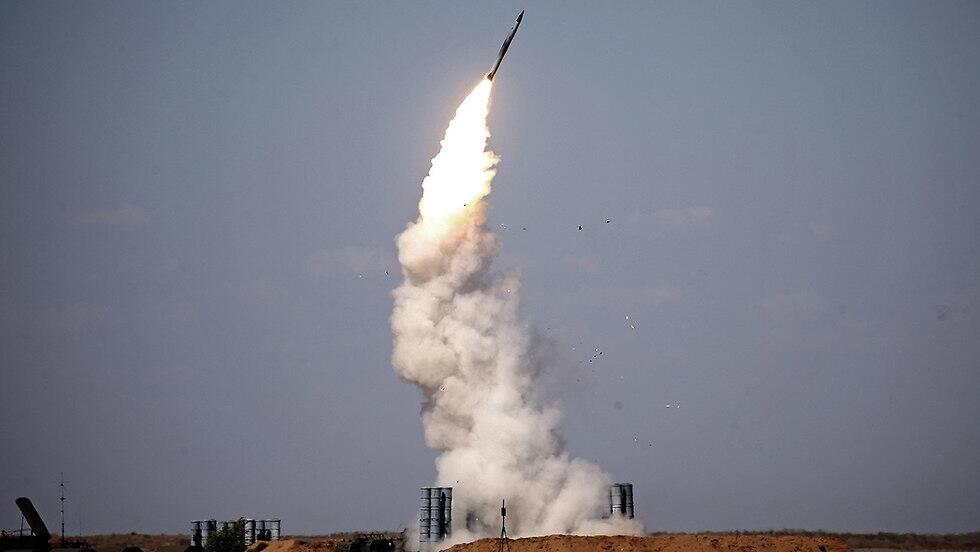Getting your Trinity Audio player ready...
The problem with the drones that Iran is supplying Russia is not that they are significantly improving the military achievements of Vladimir Putin's army on the various battle fronts in Ukraine.
The cameras installed on the Qods Mohajer-6 drones do improve the Russian army's ability to collect intel from the battle field, and help it trace artillery and anti-aircraft forces, and movement of Ukrainian armored columns.
Footage of the damage caused by the drone attack in Kyiv and footage from the launch of an interceptor missile
(Reuters)
Also, by using this drone, which carries 2-3 small missiles, the Russians are able to dismantle a tank, a self-propelled cannon, or a Ukrainian radar car.
But according to the information collected by American and British intelligence services, neither the intel collected nor the physical dismantlement are effective, and the actual advances the Russian army will be able to yield using this tool, are insignificant.
The Iranian-made Shahed-136 drones, known as a "suicide drone", are indeed much more effective and dangerous, especially when used against stationary and unarmored civilian targets.
While these are small and light aircrafts, they are loaded with fuel and several dozens of kilograms of extremely destructive explosives. They are programmed to navigate to their target, up to a range of 1000 km or more, using a GPS system, and then self-destruct.
When it comes to a large apartment building or an electric power plant, this GPS system - which can be bought in bulk even on ebay - will suffice in yielding the desired outcome: civilian casualties, refugees enclosed and traumatized in metro stations, power outages and water shortages.
Footage of an explosion in a Kyiv building and police shooting at a suicide drone
(From Twitter)
Therefore, the Shahed-136 drones pose a serious problem to the Ukrainian municipal authorities and the civil administration of President Volodymyr Zelensky.
They not only cause physical damage, but they also inflict moral and psychological harm, and give the Ukrainian civilians a feeling of helplessness against the capable Russian army.
The Shahed-136 can be operated in two ways in the battle field: The first is the "suicide drone" described, loaded with explosives that detonate on a target. The second way is nicknamed "loitering munition," in which the drone is sent to hover over a combat zone until it locates a pre-installed target using a sensor or camera, which it is programmed to destroy upon detection.
It is important, however, to clarify once again that this suicide drone does not, and will not, lead to groundbreaking outcomes in the battlefield.
One of the reasons is that the Ukrainians have learned that they cannot stay at one place for more than several hours, even if remaining hidden. Therefore, the Ukrainian artillery and tank forces arrive at a location, shoot, and immediately move on to the next spot. They also activate electronic disruption systems, and shoot down the slow drones they detect.
But it will come as no surprise if the Russians begin activating the offensive and cheap drones at higher rates, which can have more substantial effects.
Today's technical circumstances make it pretty simple to activate the Shahed-136 in large swarms of dozens, instead of launching them in pairs or groups of four, as they do today.
If the Russian decide to do this, the Ukrainians are in trouble, especially with the long winter creeping up, in which troops are limited in their movement and access to weaponry. These conditions will leave them exposed to these deadly Iranian drones.
In general, waging a war in Ukraine during the winter is bound to become one of static mutual destruction.
Iran's drones, and possibly also its semi-precision surface-to-surface missiles, will give the Russians a quantitative and qualitative advantage, on the battlefield and in the cruel and inhumane tactic of wearing down the enemy - which the Russians are adopting in targeting the civilian population of Ukraine.
An Iranian-made drone targeting a medium-size city's power plant has the potential of leaving thousands of women, children, and elderly in the cold and dark or even homeless.
There is still no official confirmation that Iran will sell Russia surface-to-surface "Fateh-110" (300 kilometer range) or "Zolfaghar" (700 kilometer range) missiles. But its likely that the American reports, and the Washington Post article, that are predicting this transaction, are correct - despite Russia and Iran's denial.
These missiles mostly target civilians. Hence, even though their benefit to the Russian military dealing with the Ukrainian army is insignificant, Putin wants them for this purpose. The conclusion is that the U.S. and NATO must quickly develop ways to approach this inhumane war strategy.
Israel must also join the efforts, even if it needs to stay under the radar and avoid political exclamations while doing so.
Another ugly side of this is the benefit the Iranians will receive from operating their weaponry on the battlefield in Ukraine. Not only will the scientists and experts refine their practice of making deadly drones and missiles, they will all so learn to make them immune to, or even overcome, the countermeasures that the West will develop, perhaps with Israel's assistance.
This war in Ukraine offers the perfect experimental platform for Iran, using Russia as a proxy to get them a spot on the international stage.
This is certainly not a good thing for Israel. For those who need a refresher- Israel has already had an encounter with the Iranian drones and missiles that Russia operated, and will probably continue to operate, in Ukraine. Therefore, most chances are that sooner or later we will have to confront a new and improved version of the Iranian arsenal.
The Israeli interests, intel and technology, are all factors that point it towards contributing to the collective Western efforts to protect Ukraine's cities from Iranian weapons.
The information that the West will hold as a result of these efforts will be of great worth to Israel's intelligence. This, aside from the humanitarian factors, gives Israel yet another reason to help Ukraine find ways to defend itself. The tricky part, however, is doing so without directly stabbing the Russians in the back.
The Russians are wary of these scenarios. This is evident though the threat made on Monday by former Russian President Dmitry Medvedev that Israeli arms supplies to Ukraine would destroy ties with Moscow. “Israel appears to be getting ready to supply weapons to the Kyiv regime. A very reckless move. It would destroy all bilateral relations between our countries," he said in a statement.
This is obviously a threat, which in other words states that if Israel actively helps Ukraine's war efforts, Russian forces in Syria could respond by limiting the IDF's freedom to counter the Iranian presence and Iranian-Lebanese precision missile production there.
While Russia does have arsenals in Syria containing long range missiles and combat aircrafts which could technically hinder the IDF's ability to act in the Syrian and Lebanese airspace, it is questionable if the the current state of the Russian army would allow it to thoroughly act upon these threats.
The IDF air force is strong, and thus Israel can stand behind its interests and counter the Russian threats, but it still may not be a good idea to get involved with one of the worlds biggest superpowers, especially when it is in a vulnerable state in which it is bound to make rash decisions.
From the cognitive and diplomatic perspective, the Israeli government and its citizens should pat themselves on the back because of the concerns many of our leaders voiced to the Western world for years, which are proving to be very much valid. As Israel expected, the Ukraine war is giving Iran a platform to act as the "axis of evil," and be part of the bloc made up of countries with authoritarian regimes, such as China, Belarus, and North Korea. This bloc considers any form of democracy or liberalism as a cultural, politically, and physical enemy which poses an imminent threat and must be wiped out completely.
It is now also clear to the world that Iran's conventional arms industry is a tangible threat on international peace and stability, especially in Europe. If the Iranians manage to become nuclear, the world is doomed.
Israel insists that Iran enthusiastically joining Putin's bloc, must urge the West to confront Iran and regard it an enemy, rather than a potential partner for a nuclear deal.
Such a compromise, experts in Jerusalem predict, will do no more than postpone Iran's nuclear efforts by a couple months, and simultaneously allow is to continue building its conventional arms industry, using the large sums of money the IRGC will have once the sanctions are lifted.
Still, the tenor in Washington DC and the EU headquarters in Brussels are hinting that not many support or intend to act on the Israeli thesis. EU Foreign Minister Josep Borrell has already suggested that he is still not convinced that Iran supplied Russia with drones, as he demanded to be presented with clear proof of such, despite the abundance of photographs.
Meanwhile, the U.S. refuses to link the Iranian aid to Russia's invasion of Ukraine, to the renewed talks on a nuclear deal. If the Iranians are ready, the Europeans and the Americans will rush to sign a renewed nuclear deal with them, on the basis that it will buy time to think of a more stable solution for Iran's nuclear advancements.
Israel must not rely on the global antagonization towards Iran as a result of the reputation it has recently bestowed upon itself. The new nuclear deal between Iran and the Western powers is still very much on the table.








